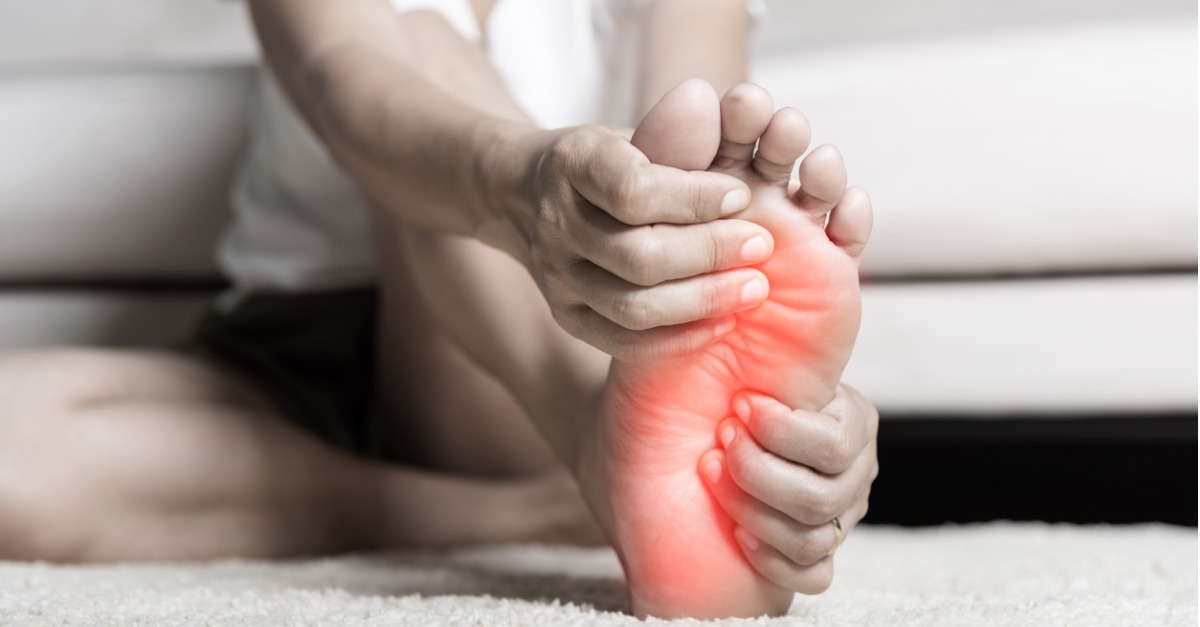- About
- News
- Careers
- Contact
- Serving the Lowcountry and Coastal Empire of Georgia and South Carolina.
-
MOBILE
APP






Serving the Lowcountry and Coastal Empire of Georgia and South Carolina.
Friday, March 29, 2024

With 26 bones, 33 joints, and more than a hundred tissues, it’s safe to say feet are among the more complex parts of your body. And since the average adult walks about 5,000 steps per day, they certainly get a lot of mileage. While all of those steps benefit your health in several ways, they can also take their toll on the many structures within your feet.
From aches and pain to nail issues and even fungus, here are some of the most common foot problems to watch for.
Bunions are bony protrusions that form on the base of your big toe. As a bunion progresses, your big toe will pull inwards, potentially affecting your toes’ alignment. You may also experience pain and pressure on the joint.
Keep bunions at bay by wearing properly fitting shoes. Limit wearing any shoes that constrict the toes, including high heels, flats, and other footwear with a narrow toe box.
If the edge or corner of your toenail is red and inflamed, you probably have an ingrown toenail. Usually affecting your big toe, this condition occurs when the nail grows into the toe’s surrounding flesh.
At best, an ingrown toenail is a painful nuisance. But for people with diabetes, these and other seemingly small foot issues could become serious. Limited blood circulation caused by diabetic retinopathy can make ingrown toenails slow to heal. And even if you aren’t diabetic, an ingrown toenail that goes unaddressed could lead to infection.
Like bunions, ingrown toenails can be caused by pressure from shoes that are too tight. Prevent them by wearing the right size and fit. And when it comes to clipping, aim to trim your nails short and straight.
Athlete or not, this infection affects up to 25% of the population. The condition is actually a form of ringworm, a fungus that causes dryness, scaling, itching, and burning. In severe cases, you might encounter pus-filled blisters and painful skin cracking.
Since this fungal infection thrives in moist, damp conditions, be sure to change your socks quickly after your feet sweat or get wet. Wait until your toes are completely dry before donning a new pair. Athlete’s foot is also contagious, so wear sandals in public gyms, pools, and showers.
Have persistent heel pain? It could be plantar fasciitis, a type of inflammation that affects the thick band of tissue on the bottom of your foot. Known as the plantar fascia, this tissue can become strained or even torn during activities like running and ballet. Having flat feet, being on your feet for long durations, and being overweight are additional risk factors.
For athletes, tactics like stretching, warming up properly, and increasing workout durations gradually can help prevent plantar fasciitis. If you have flat feet or stand for long periods, wearing supportive footwear or insoles may help.
While these foot problems are all slightly different, they often share a common cause: poorly fitting shoes. Blisters are fluid-filled bubbles on your skin’s surface, whereas a corn is a buildup of hard skin near a bony area. A callus is also a buildup of hard skin but is usually found on the underside of the foot. Like many of the conditions above, wearing shoes that fit properly and keeping your socks clean and dry will greatly reduce your risk of these frustrating foot problems.
With so many conditions that can affect your feet, it’s best to see a specialist at the first sign of a foot problem. Our podiatry department is your source for top-notch foot care. To schedule an appointment, view our list of providers online and call 912.691.3600.
Whether you are looking for a primary care doctor or a pediatrician, or another medical specialist, SouthCoast Health has you covered with its wide range of world-class healthcare services, available throughout the Coastal Empire and Lowcountry. SouthCoast Health has 120 physicians and medical professionals in 18 locations in Savannah, Richmond Hill, Pooler, Rincon, Baxley, Hilton Head, Hinesville, and Statesboro. SouthCoast Health offers comprehensive medical services including: Family Medicine, Internal Medicine, Pediatrics, Allergy and Asthma, Cardiology, Endocrinology, Eye Care, Imaging, Infectious Diseases, Nephrology, Neurology, Physical Therapy, Podiatry, Sleep Medicine, Surgery, Clinical Trial Research Studies, Diabetic Self-Management Training Sessions, Dietetic Counseling, Laboratory Services, Massage Therapy, Optical Shop, Pharmacy, and Urgent Care.